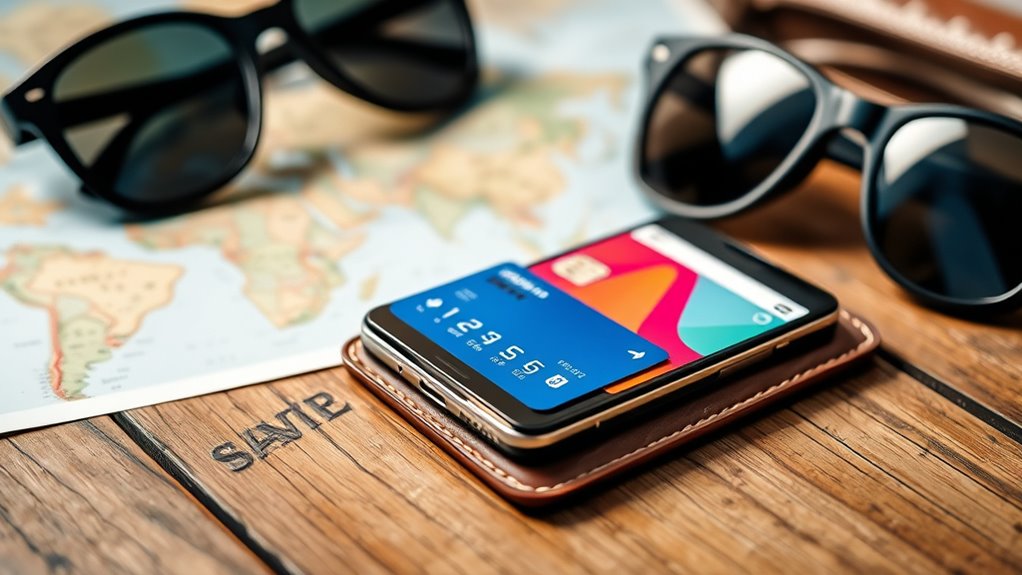To avoid foreign transaction fees abroad, use a credit card that doesn’t charge those fees, and always select the local currency to get better exchange rates. Consider preloaded travel or currency cards for extra savings and be cautious of dynamic currency conversion offers, which often hide extra costs. Avoid multiple ATM withdrawals by planning ahead, and carry some local cash for places that don’t accept cards. If you want tips to stay friction-free, keep exploring for more expert advice.
Key Takeaways
- Use credit cards with no foreign transaction fees and opt to pay in local currency.
- Decline dynamic currency conversion offers; always choose the local currency during transactions.
- Verify your card supports international use and contactless or chip-enabled payments.
- Carry local cash or preloaded travel cards to minimize currency exchange fees.
- Review and set your payment preferences to automatically use local currency for purchases abroad.
Choose the Right Credit Card for International Use
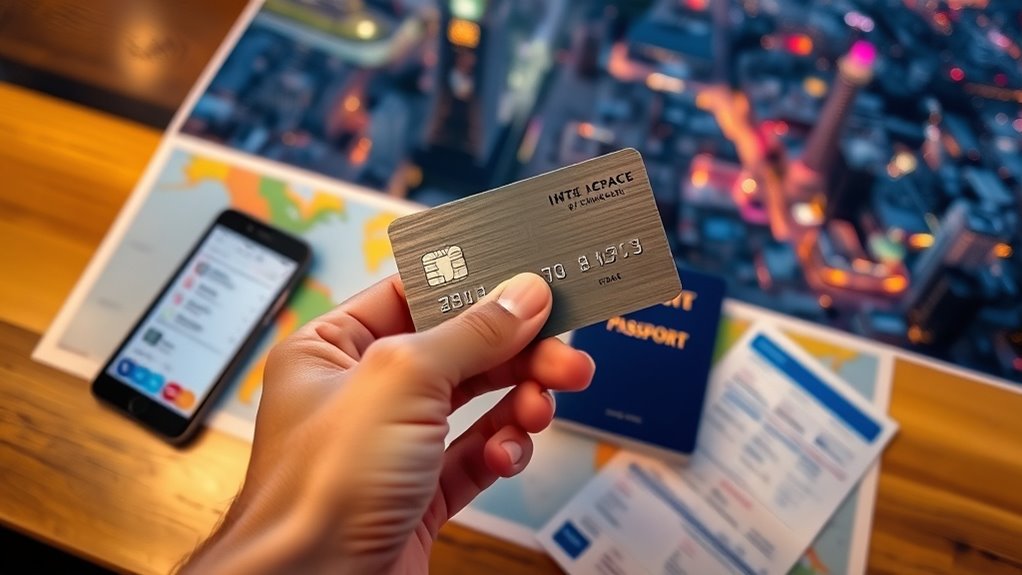
When selecting a credit card for international travel, it is vital to find one that minimizes extra fees and offers favorable terms abroad. Look for cards that provide good credit card rewards, especially those that give points or cashback on travel purchases. These rewards can help you save money on flights, hotels, and dining abroad. Additionally, choose a card that includes travel insurance, offering coverage for trip cancellations, delays, or medical emergencies. Travel insurance adds peace of mind and can save you significant expenses if unexpected issues arise. Avoid cards with high foreign transaction fees, and prioritize those with perks tailored for travelers. By selecting a card with strong rewards and insurance benefits, you maximize value and protect yourself during your international adventures. Incorporating sustainable practices into your travel plans can also enhance your experience and support ethical tourism. Considering the cost of travel gear, such as electric bikes or portable energy sources, can also contribute to more eco-friendly and cost-effective travel. Being aware of foreign transaction fees and how they impact your budget is also crucial for financial planning abroad. Additionally, researching credit card exchange policies can help you understand how currency conversions are handled and avoid unexpected costs. Moreover, opting for a card that emphasizes transparent fee structures ensures you are fully aware of all charges before making transactions.
Opt for Cards With No Foreign Transaction Fees
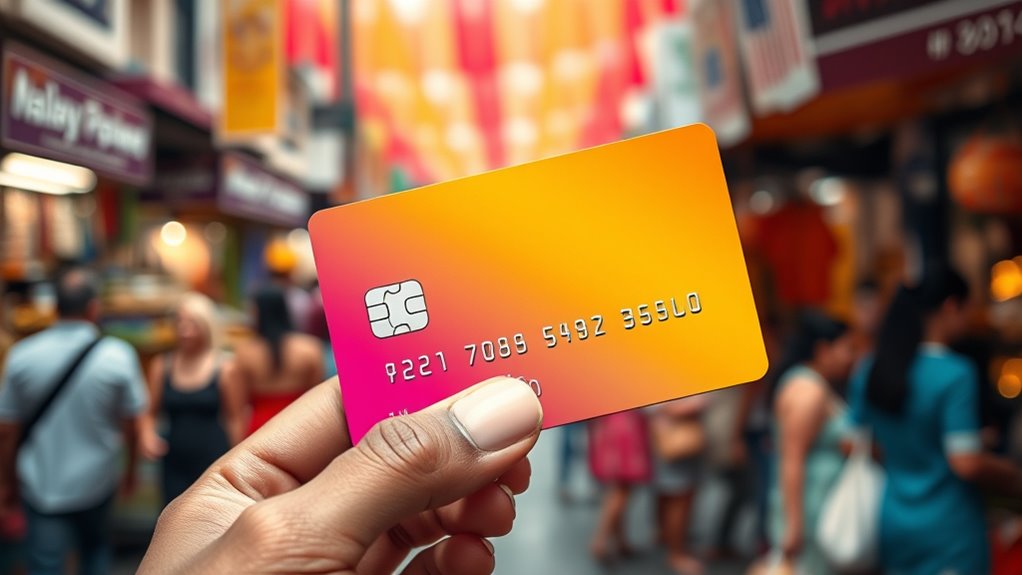
Choosing a card without foreign transaction fees saves you money on every purchase abroad. These cards often work seamlessly with international merchants, making transactions smoother. Over time, avoiding extra fees can lead to significant savings you might not notice at first glance. Being aware of potential trust issues can help you select a card that provides security features to protect your transactions. Additionally, understanding how foreign transaction fee policies are applied can help you make more informed choices. Familiarizing yourself with interbank exchange rates can also assist in understanding the true value of your purchases. Furthermore, selecting cards with aesthetic design can enhance your overall travel experience by making your payment methods more personalized and stylish. Implementing fraud prevention tools such as real-time monitoring and multi-factor authentication can further safeguard your transactions during travels.
Benefits of No Fees
Ever wondered how much extra you could be paying just to use your credit card abroad? Choosing a card with no foreign transaction fees offers clear benefits.
- Save money by avoiding additional charges on every purchase.
- Simplify budgeting with consistent costs, unaffected by exchange rate fluctuations.
- Enjoy seamless transactions without the worry of hidden fees.
- Enhance transaction security, reducing the risk associated with exchange rate changes during your trip.
- Additionally, opting for cards designed with robust materials for long-lasting use can help prevent unexpected issues during international travel.
Without foreign transaction fees, you get to spend more on experiences rather than fees and hidden costs. Plus, you benefit from better transparency in your expenses, making it easier to manage your travel budget. These cards keep your transactions straightforward and protected, giving you peace of mind while exploring abroad.
Card Compatibility Abroad
Are your current credit cards compatible with international use without incurring foreign transaction fees? Many cards now support chip compatibility and contactless payments, making transactions smoother abroad. To avoid surprises, verify that your card works seamlessly in different countries. Some cards are designed for global use and support tap-and-go payments, which are faster and more secure. Check the table below for key features:
| Feature | Compatibility |
|---|---|
| Chip Compatibility | Ensures secure transactions at EMV chip terminals |
| Contactless Payments | Enables tap-and-go convenience abroad |
| International Use | Confirmed by issuer for foreign transactions |
Additionally, understanding the technology behind these features can help you choose the best card for international travel. Being aware of the currency conversion process can also prevent unexpected charges. Familiarizing yourself with interchange fees can help you understand how transaction costs are calculated. Choosing a card with zero foreign transaction fees can significantly save money during your travels. Being aware of these features and benefits can make your international trips more enjoyable and stress-free. Moreover, researching bank SWIFT/BIC codes can facilitate easier international money transfers and avoid delays.
Hidden Cost Savings
Did you know that many credit cards charge extra fees every time you make a purchase abroad? Choosing a card with no foreign transaction fees can save you a lot. Here’s how:
- Reduce unexpected costs, especially when splitting bills or shopping.
- Save on currency conversion fees, which can add up quickly.
- Keep more money available for cryptocurrency investments or other financial goals.
- Avoid complications from international banking regulations that may restrict or flag transactions.
- Understanding the different types of cookies helps you manage your online privacy and avoid tracking issues during your travels. Additionally, selecting a card that avoids hidden fees can prevent surprise charges and ensure smoother transactions abroad. Using an international-friendly card can further streamline your financial experience overseas. Being aware of financial regulations helps you prevent potential issues with your bank or credit provider during international transactions. Choosing a card with no foreign transaction fees is especially beneficial for frequent travelers, reducing the overall cost of international purchases.
Use Local Currency When Making Purchases

When making purchases abroad, always choose to pay in the local currency to avoid extra fees. You should recognize the available currency options and adjust your payment settings accordingly. Carrying some local cash can also help you prevent potential conversion costs and ensure smoother transactions. Additionally, understanding currency exchange principles can help you make more informed financial decisions while traveling. Being familiar with foreign transaction fees can further help you avoid hidden charges that may increase your costs. Learning about AI in finance can also provide insights into how financial institutions develop tools to assist travelers with currency conversions and fee management.
Recognize Currency Options
Choosing to pay in the local currency is often the best way to avoid unnecessary foreign transaction fees. When you recognize currency options, you control how much you’re charged by the exchange rate. Be aware that currency fluctuation can impact the actual cost of your purchase, making it essential to choose wisely. Here are four tips to help you make the best choice:
- Always select the local currency when prompted during transactions.
- Avoid opting for your home currency, which often involves additional fees.
- Check if your card provider applies dynamic currency conversion—sometimes it’s not in your favor.
- Familiarize yourself with the current exchange rate to anticipate costs accurately.
Adjust Payment Settings
Adjusting your payment settings to always use the local currency can substantially reduce foreign transaction fees. When you select this option, your card handles currency conversion at the point of sale, avoiding dynamic exchange rates that banks or merchants might apply. This ensures you’re paying the most accurate rate, often better than what’s offered through dynamic exchange adjustments. By opting for local currency, you prevent unnecessary markups associated with currency conversion, saving money on each purchase abroad. Before traveling, check your card’s settings to enable “use local currency” or similar options. Doing so keeps your transactions straightforward and transparent, reducing the chances of unexpected fees due to unfavorable currency conversion rates. It’s a simple step that can make a significant difference in managing your expenses abroad.
Carry Local Cash
Carrying local cash makes it easier to manage expenses and avoid foreign transaction fees. When you use local currency for purchases, you bypass extra charges from cash exchange or currency conversion fees. To maximize savings, consider these tips:
- Carry enough local cash for daily expenses to reduce frequent cash exchanges.
- Use ATMs in your destination for better rates and minimal fees.
- Withdraw larger amounts at once to avoid multiple cash exchanges.
- Keep some local cash on hand for places that don’t accept cards.
Consider Prepaid Travel Cards or Currency Cards
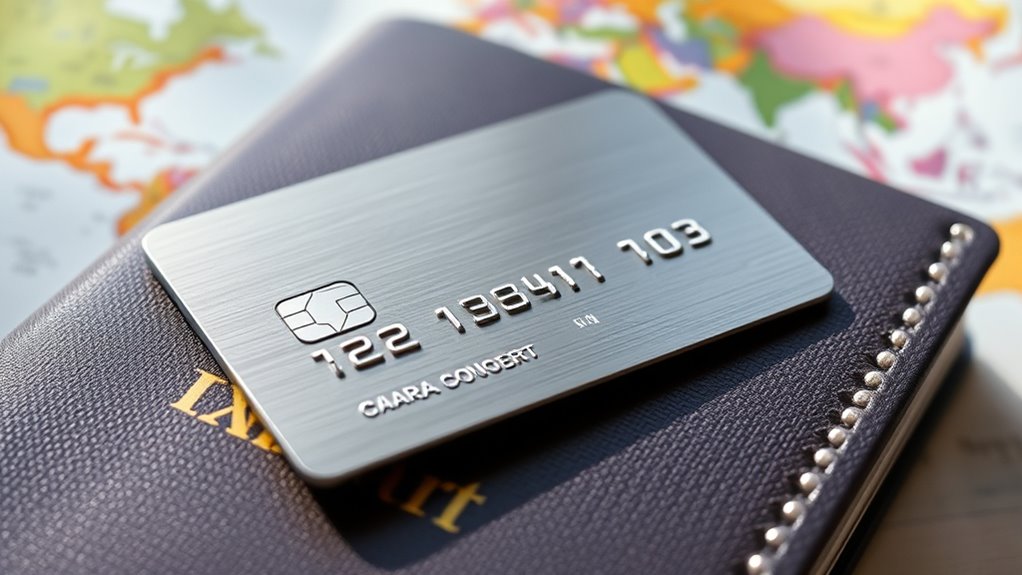
Have you considered using prepaid travel cards or currency cards to manage your expenses abroad? These cards let you load a specific amount of money in different currencies, helping you avoid foreign transaction fees. With a prepaid card, you won’t need to carry large amounts of cash or worry about overspending. Many of these cards are compatible with digital wallets and support mobile payments, making transactions quick and convenient. Using a currency card guarantees you lock in exchange rates beforehand, protecting you from fluctuating rates. Plus, they often come with added security features, like PIN protection and the ability to freeze the card if lost. By choosing a prepaid or currency card, you control your spending more effectively while avoiding costly fees and enjoying seamless transactions during your trip.
Avoid Dynamic Currency Conversion Offers

When offered the choice between being charged in your home currency or the local currency, always decline the dynamic currency conversion option. This practice often conceals hidden fees and unfavorable currency exchange rates. Dynamic currency conversion makes the transaction seem simpler but usually results in higher costs. To avoid falling for this trap, keep these tips in mind:
- Always select the local currency to ensure you’re using the actual currency exchange rates.
- Check your card’s terms for foreign transaction fees to understand additional charges.
- Use your bank’s official currency exchange rates rather than those offered at the point of sale.
- Be cautious of merchants or ATMs pushing dynamic currency conversion, as they may profit from unfavorable rates.
Be Strategic With ATM Withdrawals and Fees
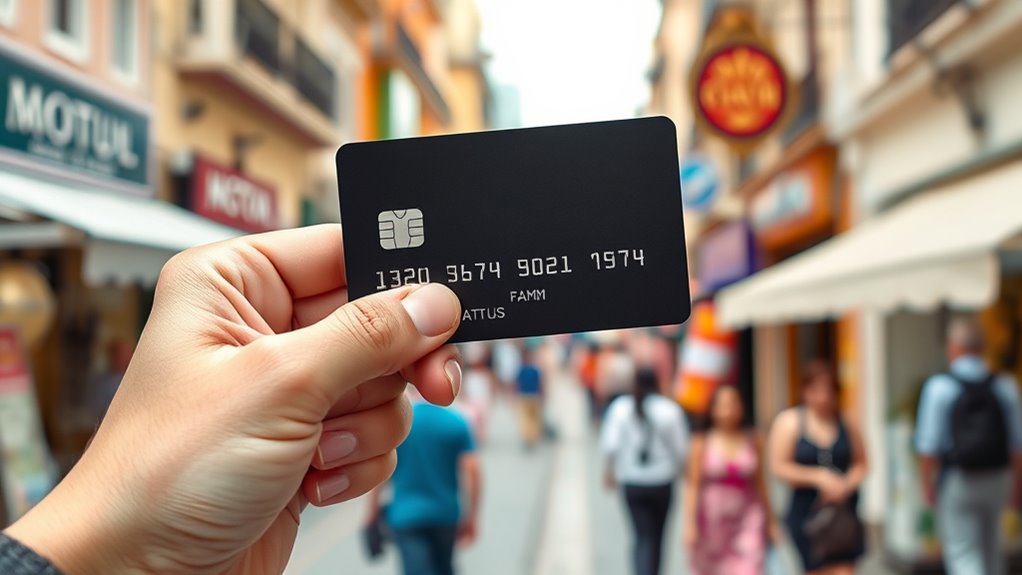
ATM withdrawal fees can quickly add up, especially if you’re not strategic about how and where you take out cash. To minimize costs, plan your withdrawals using ATM fee strategies like sticking to partner banks or networks that offer free or low-cost foreign cash access. Avoid unnecessary fees by withdrawing larger sums less frequently rather than multiple small transactions. Research your bank’s policies on foreign ATM use beforehand, and consider carrying a backup card in case one is declined or unavailable. Be mindful of dynamic currency conversion offers at ATMs, which often come with hidden fees. By being deliberate with your ATM use, you can considerably reduce expenses and keep your travel budget on track.
Frequently Asked Questions
How Can I Verify if My Card Is Accepted Internationally?
To verify if your card is accepted internationally, you should check with your bank or card issuer about their international card acceptance and merchant compatibility. Look for signs like the Visa, Mastercard, or other logos at stores or online. You can also call customer service or visit your bank’s website to confirm which countries and merchants support your card. This helps guarantee smooth transactions when you’re abroad.
Are There Any Hidden Fees With Prepaid Travel Cards?
Prepaid card pitfalls often include hidden fee traps that catch you off guard. You should scrutinize terms thoroughly, as some prepaid travel cards charge activation fees, ATM fees, or reload costs. These hidden fees can surprise you, so always read the fine print before you load your card. Stay savvy by comparing cards and searching for transparent terms to avoid unwelcome expenses and maximize your money during your travels.
What Are the Best Apps for Tracking Foreign Transaction Fees?
You want to stay on top of foreign transaction fees, so using mobile banking apps is a smart move. Apps like Revolut, Wise, and Mint help you track currency conversion rates and monitor charges in real-time. They give you clear insights into your spending abroad, making it easier to avoid unexpected fees. With these apps, you gain control over your expenses and guarantee you’re not caught off guard by hidden charges while traveling.
How Do Exchange Rates Differ Between Banks and Currency Exchanges?
Think of exchange rates like a dance, with banks and currency exchanges leading differently. You’ll find banks often set their own pace, offering slightly higher currency conversion rates, while currency exchanges might dance more closely to the market but add hidden fees. To avoid stepping on toes, do a fee comparison first, and understand that rates can fluctuate like the rhythm of a song, impacting how much you get when exchanging money abroad.
Can I Avoid ATM Withdrawal Fees With Specific Banking Accounts?
You can often avoid ATM withdrawal fees by choosing the right bank account options. Look for accounts that offer fee waiver programs, which eliminate or reduce these charges when you use certain ATMs. Some banks partner with networks to waive fees for international travelers, so check your bank’s policies. By selecting the right account, you’ll save money and enjoy easier access to cash abroad without extra costs.
Conclusion
By choosing the right card and being smart with your spending, you can avoid hefty foreign transaction fees. For instance, using a card with no foreign fees can save you up to 3% on every purchase. Did you know that travelers who pay attention to these tips save an average of $200 annually? Stay strategic, use local currency, and minimize ATM fees to make the most of your trip without overspending.
